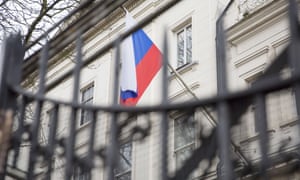Patrick Wintour
 The expulsions of Russian diplomats on Monday reflect how widely Vladimir Putin has attempted to wage his brand of hybrid warfare and how many leaders and their intelligence agencies he has angered in the process.
The expulsions of Russian diplomats on Monday reflect how widely Vladimir Putin has attempted to wage his brand of hybrid warfare and how many leaders and their intelligence agencies he has angered in the process.
Even before the Salisbury poisoning, many governments had lost patience with Vladimir Putin’s grey war for domestic reasons of their own. Their response is not just an act of solidarity with the UK but a collective pushback.
Their citizens may not have been poisoned, but their elections have been disrupted, their cyber networks attacked and, time after time, their UN resolutions condemning the use of chemical weapons in Syria vetoed.
In France, the presidential campaign of Emmanuel Macron was hacked and in 2015 hackers effectively took an entire French TV station, TV5Monde, off the air. In the US, the army of Russian bots did their best to disrupt the 2016 presidential election. In Germany, the foreign ministry was infiltrated by Russian hackers last month, forcing computer systems to close.
In Poland, the defence ministry says it and other institutions have been targeted by an average of one potentially dangerous cyber-attack a week over the last six months. In Lithuania, the government found Russian spyware on its computers. As far back as 2007, Estonia suffered a three-week wave of cyber-attacks.
At all times Russia has denied responsibility.
In this context, the still murky chain of events in Salisbury – the first use of chemical weapons on European soil since the second world war – may be the moment when the west collectively decided it was time to warn that Russia’s “disruption as usual” had to come to an end.
For that, the UK Foreign Office can give itself a rare pat on the back. Its senior diplomats recognised that Putin had set them a test of whether the UK retained a convening power at the UN, Nato, in Washington and – despite Brexit – even in the EU.
There were missteps. The defence secretary, Gavin Williamson, calling for Russia to shut up and go away was childish and misread how central European countries viewed Russia. Similarly, Boris Johnson making a loose comparison between Putin and Adolf Hitler was a mistake and hardly likely to increase the safety of British football fans travelling to Russia.
It was quite possible that Macron, Donald Trump and Angela Merkel would have weighed up their collective self-interest in the wake of Putin’s re-election for a fourth term and made a pragmatic decision to side with Russia’s strongman rather than a fading power in the midst withdrawal from the EU.
Indeed, some countries with strong energy links with Russia insisted Putin had to be regarded as innocent until proven guilty and argued no action was required at least until the Organisation for the Prohibition of Chemical Weapons had come to a definitive conclusion on responsibility for the Salisbury attack – something that was unlikely for many weeks if not months.
Russia’s instinct was that an appetite for delay would prevail in the EU and the affair would fizzle out, revealing the UK – Russia’s sternest critic for the past decade – to be weakened and isolated.
The turning point was the joint statement by the US, Germany, France and the UK issued on 15 March stating unequivocally that Russia was responsible. It is probably no coincidence that the intelligence agencies of this quartet cooperate closely, and it is likely either classified information was exchanged about the Salisbury episode or there were discussions about wider Russia malfeasance. The formulation in the joint statement that “no other plausible explanation” for the event was well drafted to maximise support.
Overall, the ageing machine that it is Her Majesty’s diplomatic service, marginalised by Brexit and funding cuts, showed it has a few miles left to run.
But Russia, for its part, will take solace in arguing that expulsions are more symbolic than debilitating. Moscow will point to the minority of EU states that sat on their hands and assure itself that most diplomatic contacts will continue as usual. Replacements for those expelled will probably be appointed discreetly in a year’s time. The summer World Cup will reveal a different, modern side to Russia. The laws of politics and energy will require the west to engage.
The Foreign Office admits privately that the expulsions in themselves will not prompt a rethink by a man now reinstalled in power and not due to retire until 2024 at the earliest. It insists it will step up the economic pressure on the Putin oligarchs.
Johnson, in his more reflective moments, argues that the ultimate task is to change the Russian state of mind. “It’s a revanchist, bitter feeling about the way the cold war ended and about what happened to the old Soviet Union, and a feeling that Russia is now simply the controller of a much-diminished sphere of influence,” he has said. “Putin feels Russia lost out and he wants to cause trouble wherever he can. It’s a desire for the world to take Russia seriously again, at any price.”
No comments:
Post a Comment